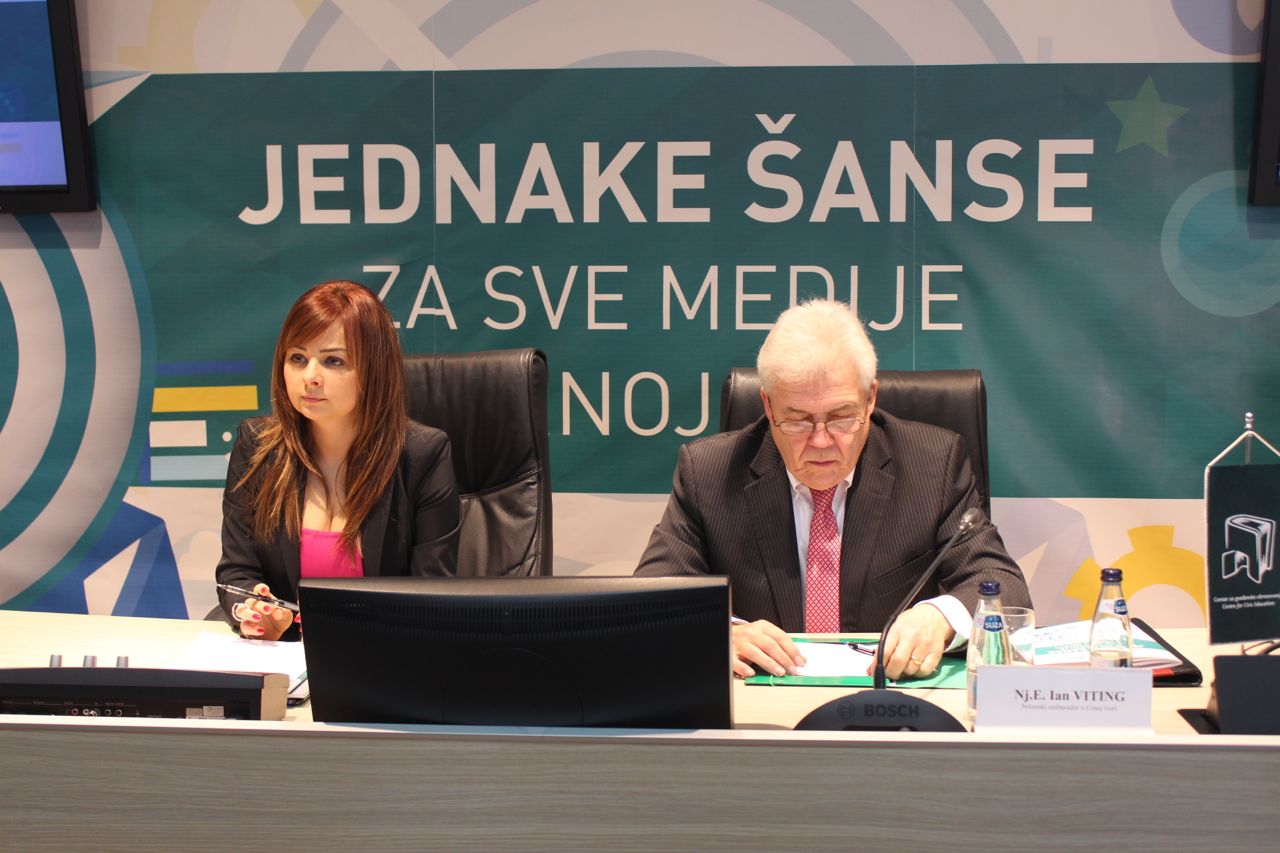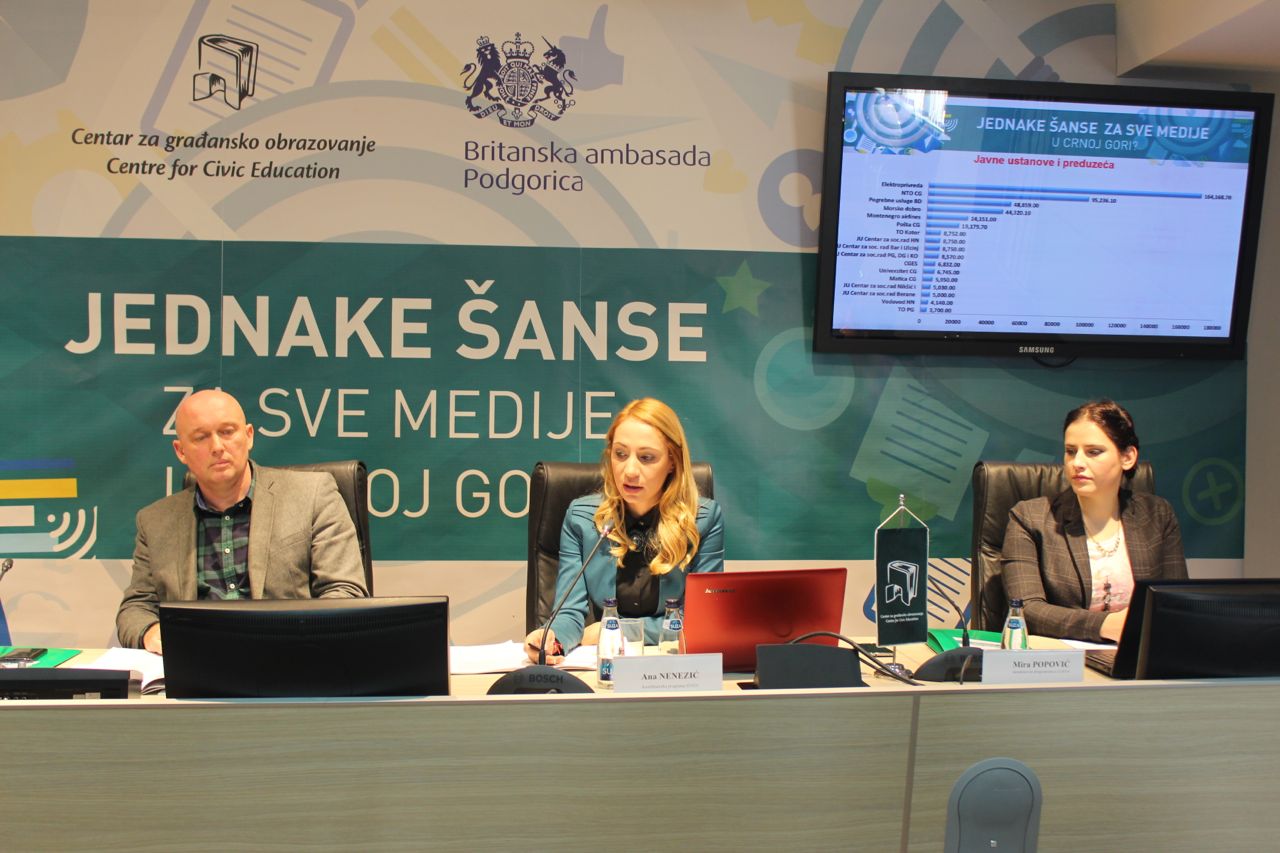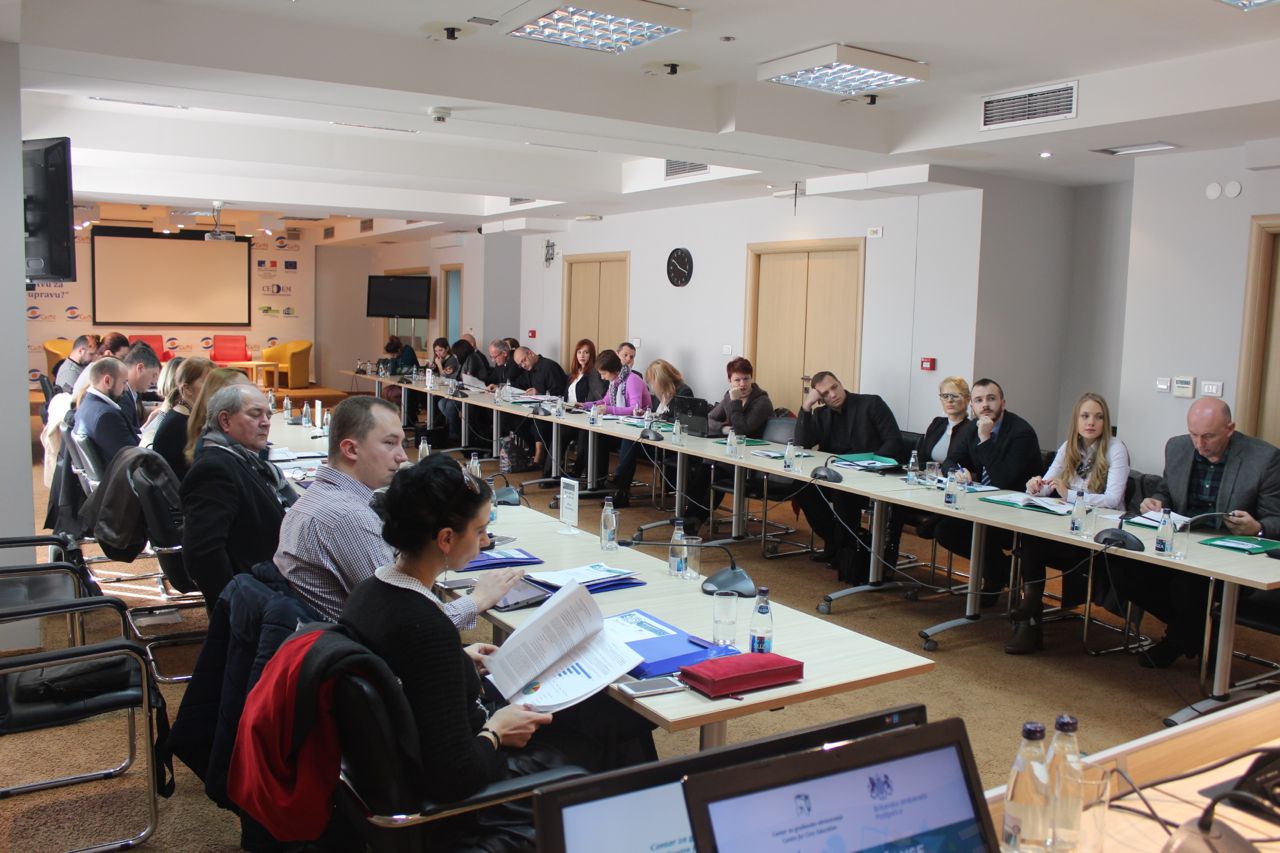Centre for Civic Education (CCE) organised a conference today, with the support of British Embassy in Podgorica, titled « Media financing from public funds in Montenegro ».
H.E. Ian Whitting, British ambassador in Montenegro, opened the conference and elaborated the motives of Embassy’s participation in this project by pointing out: “Everyone who lives in a democratic society is aware of the importance of media. Democracy can hardly develop and endure without free media that report on matters of public interest in a professional and ethical manner. In Montenegro, like in any other transitional society, importance of this role is even greater. It is up to media to investigate cases, to report, and question ingrained opinions and customs.” He simultaneously noted that “Here, the media are still vulnerable, regardless of the importance of their role. Media across the globe face serious financial problems, and the situation is even worse on small Montenegrin market.” He further reflected on the assessment of the European Commission on Montenegro that “uncertain economic situation of journalists increases the risk of interference in editorial policy and possible self-censorships, and has a negative impact on the quality of reporting and professionalism.” Finally, he expressed the satisfaction that “we were able to support the work of our friends from the Centre for Civic Education on the project “Equal chances for all media in Montenegro”. I expect that this contribution will result in the increase of transparency and more accurate definition of mechanisms of financing of media. Final outcome will be a healthier media scene and a better position and work of media employees. Montenegro and its citizens can only benefit from this”, Witting concluded.
Daliborka Uljarević, CCE Executive Director, underlined that “we can speak about freedom of media, media pluralism and competitive market only in normatively and institutionally defined areas. However, all these principles are nowadays undermined in Montenegro. There are no clearly defined criteria for the allocation of resources to media from public funds, which easily converts discretional authorisations into various forms of abuse. Then, we have protectionism, and further media polarisation which renders media market into a fixed match, which again has a negative impact on already concerning state of affairs within media scene in Montenegro. In such circumstances, freedom is being narrowed, particular interests gain on strength at the expense of professional ethics, and Montenegrin society, with citizens in its core, becomes the victim of conflict of government with “misfit” media, but also of internal media wars”. She stated that “CCE’s findings show that the financing of media in Montenegro from public funds remains uncontrolled, unregulated and opaque, as well as that the authorities failed to invest efforts to improve this area, even though this topic has been the subject of discussion during last four years, and it is a matter of growing concern for relevant international organisations, since it poses a sophisticated, but powerful, form of pressure on media, undermines the competitiveness on market and development of media, especially of media critically oriented toward the authorities.” Uljarević also stated “I know that many are angry and that they are trying for years to dispute some of the undisputed facts that we present, but there are numbers and figures based on official replies from public sector bodies, which prove that authorities «award» the media which report positively on them, through selective allocation for advertising and other public funds – thereby practically «sanctioning» critically oriented media through the deprivation of those resources. It is worth of mentioning that this is the money of tax payers who, nevertheless, have different opinion on social-political situation and such investments in media are a reflection of disrespect of those differences among our citizens.” She assessed that “it is hard to come across an objective argumentation as to why media in Montenegro should not have equal chances, therefore I hope that during today’s discussion we will come up with new, more constructive suggestions that would regulate this area in a non-discriminatory and sustainable manner”. “Finally, government in Montenegro will change one day, and those who are currently in a favourable position, given the current state of affairs, could soon find themselves in a completely opposite situation. Thus, there is no reason for all media not to advocate the conditions that secure fair competitiveness and narrow the field for any potential interference from government”, Uljarević concluded.
Mira Popović, CCE programme associate, presented the course of research and pointed out that, out of 342 public sector bodies, 226 of them submitted their replies, or 60% of bodies, while 116 bodies, or 34%, refused to submit the information requested, whereby the average waiting time for the response was 90 days. Thereby, she clarified that there are two groups of bodies that failed to submit their replies: those bodies that opted for “principle of silence”, and those that rejected the request for free access to information. “In both cases, it should be noted that it is devastating that institutions, financed by tax payers money, refuse to disclose the information on spending, which in turn rises a suspicion regarding the manner of their spending, and purpose of their allocation”, Popović emphasised. Following bodies found themselves on the “black list” of opaque bodies, according to conducted research: Ministry of Economy, Ministry of Labour and Social Welfare, Ministry of Transport and Maritime Affairs, Capital City of Podgorica, Bar Municipality, Municipality of Ulcinj, Municipality of Plav, Agency for Environmental Protection, Agency for Foreign Investment Promotion, Public Health Institute, the National Parks of Montenegro, Airports Montenegro, Plantaže ” 13 July” and Railway Infrastructure, out of the subjects belonging to Government, local self-government, or that were identified as major consumers on media market.
Ana Nenezić, programme coordinator at CCE, presented in detail the findings of annual research on public spending in media sector in Montenegro for 2014. At the end of her presentation, she highlighted the conclusions and recommendations.
Presentations were followed with a discussion with representatives of various media and institutions.
This conference is final part in the implementation of project “Equal chances for all media in Montenegro”, conducted by the CCE with the support of British Embassy, within the framework of the CCE’s sub-programme Media and democracy. The objective of this project is to increase the awareness on responsible spending of money from Budget of Montenegro, by pointing out to relation between public sector and media, through financial allocations on the grounds of determined services. In that context, under the Free Access to Information Law, the CCE has been collecting the information from May to December 2015 regarding the allocation and the amount of financial resources by public sector bodies, based on the agreement on provision of services, specialised services or other, to media, PR agencies, production houses and agencies for research of public opinion. Gathered information were analysed and incorporated in the report Equal chances for all media in Montenegro?, which was presented at the conference.
Meeting gathered around 40 representatives of media, Government, NGOs, political parties and diplomatic corps.
Svetlana Pešić, programme associate



